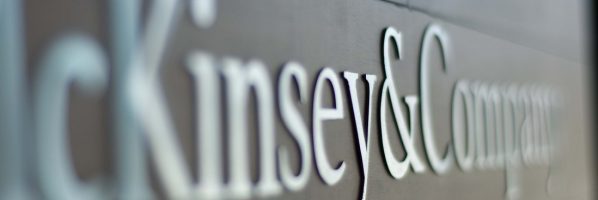New MBA Jobs: BCG, Capital One, Accenture and More

There’s always new and exciting job opportunities out there for MBAs. Whether your a seasoned business professional who sought an MBA to reach a high level position, or a new MBA grad looking for an entry level consulting job, here’s this week’s top new MBA jobs.
Top MBA Recruiters: Breaking Into Personal Care Empire L’Oreal

Considered by many as the world’s top beauty brand, L’Oreal is well known for its well-known fragrances, hair, nails, makeup, and skincare products, with a portfolio boasting legendary brands like Maybelline, Garnier, Redken, and Ralph Lauren. Headquartered in Clichy, Hauts-de-Seine, France, the company has also become a surprisingly strong top MBA recruiter. Lets take a look at what business school students need to know about the personal care empire.
LA Small Business Growth, UCLA Time Management Advice, and More

Take a look at some of the top stories coming out of the Los Angeles business schools this week.
The Growing Role of the CIO – Wall Street Journal
Vijay Gurbaxani, professor of business and computer science at the the Paul Merage School of Business at the University of California, Irvine, recently sat down with Ben Fried, CIO at Google Inc., and the Wall Street Journal for a conversation on the changing role of the CIO in today’s companies. The conversation was led by Nikki Waller, WSJ bureau chief.
Gurbaxani discussed changing technology and its impact on business, particularly the importance of cultivating talent in machine learning. For companies to stay current and competitive, he says, they must perfect the art of gathering data and putting it to good use.
“If you fall behind your competitors in developing this new know-how and leveraging, you’re going to fall further and further behind,” Gurbaxani said. “So my message to you would be get out there in a hurry.”
To read more excerpts from the interview, click here.
Study: L.A.’s Small Businesses Optimistic About Growth – Los Angeles Business Journal
A recent survey, conducted by 1st Century Bank in a partnership with Beacon Economics, has showed positive signs for LA small business growth, which is projected to continue through the end of the summer.
The study, which surveyed 150 small businesses in 30 core industries, reported a number of findings that offer hope and a positive outlook for small business owners in Los Angeles. About 78 percent of businesses reported that they expected to see an increase in market demand, while 54 percent witnessed an increase in profit margins over the past six months. Nearly 56 percent of the businesses reported a boost in sales during that same period, and over 70 percent expected to see further increase during the next six months.

More than 70 percent of small business owners in LA are expecting even more growth within the next six month.
According to Beacon Economics research director Adam Fowler, small businesses are a crucial part of the Los Angeles economy and throughout the nation.
“If we don’t understand small-business sentiment,” he comments, “we can’t know the direction this important sector will be heading in … nor can we improve conditions for their success.”
Click here to learn more about the LA small business growth research and look at the complete report here.
Time Management for Startups: Entrepreneurs Act as if Future Hours Aren’t Worth Much – UCLA Anderson Review
While larger companies have become increasingly aware about the importance of time management in a hyper efficient work environment, the same may not be true for entrepreneurs. Upstarts in the business world are as notorious for breaking certain conventions as they are for cutting their teeth, putting in triple-digit hour work weeks to build companies from scratch. And the reason being, says UCLA Anderson‘s Charles J. Corbett, is that there isn’t enough research quite yet.
“I realized there wasn’t much out there,” Corbett said in a UCLA Anderson Review interview. “A lot of the issues that entrepreneurs face don’t come up in our core management studies.”
Alongside fellow UCLA Anderson and INSEAD professor Guillaume Roels, and University College London’s Onesun Steve Yoo, Corbett found that entrepreneurs have to think of time management in the terms of their future, rather than today. And the trick is to understand “net present value (NPV).”
“But, according to Corbett, Roels and Yoo, people, including entrepreneurs, aren’t very good at thinking about their time in the same way. When people think about the value of their time, they tend to think about its current value, today, and not the future ramifications of having that time today. Correctly anticipating those dynamics, ‘NPV thinking’ is particularly important for entrepreneurs with the ambition to grow their business.”
You can read more from the trio’s time management research here.
The Best Business Schools for Landing Top Consulting Jobs

Clear Admit recently explored which business schools help prepare MBAs the most for a career in consulting, which you can read below.
With starting salaries in the $140,000 to $150,000 range and a customary $25,000 signing bonus on top of that, it’s no wonder so many business school students target the prestige consulting firms known as the “MBB”—McKinsey & Company, Boston Consulting Group (BCG), and Bain & Company—as their post-MBA landing pads. That $170,000+ annual compensation package can quickly cut any MBA loan debt you may have taken on down to size.
Indeed, management consulting has been one of the most coveted career paths for fresh MBA grads for ages. And though the technology industry has in recent years been stealing some grads from the consulting industry’s traditional slice of the pie, the most recent MBA employment reports reveal that consulting is already making a comeback against tech at certain schools.
The opportunity to work with a range of clients comprised of many of the world’s most celebrated businesses across industries—tech included—is part of the appeal of consulting. In many ways, a top consulting gig allows MBA grads to continue their management education while getting paid for it—and further honing their skills and expertise by helping solve a wide variety of business challenges. And, not for nothing, breaking into the MBB is a highly competitive pursuit—one that almost assures that your colleagues will be smart, driven people you’ll get a lot out of working with.
Finally, where the top consulting firms are choosing to find their talent reflects on the quality of the education those schools’ students are getting. In many ways, the hiring practices of the MBB can serve as a gold star standard of sorts for MBA programs.
Elite Firms Hire Grads from Elite Business Schools
The crème de la crème of leading business school talent has headed toward the top consulting firms for decades—and performed well there—creating a virtuous circle of sorts in which the firms’ appetite for such talent only grows. And while this piece focuses on MBB, we should note that a host of other consulting firms—Deloitte, A.T. Kearney, Accenture, Strategy&, and Oliver Wyman among others—are also highly prized post-MBA destinations.
If you are looking to see which business schools send the greatest percentage of their graduates into consulting overall, don’t miss our September 2017 analysis of leading consulting industry feeder schools. Which schools top the list? And what stands out about how these schools successfully train students for careers in consulting?
Looking at Class of 2016 graduates, the University of Virginia’s Darden School led the pack, with 38 percent of its graduates heading into consulting. Columbia Business School was next, sending 35 percent, followed closely by Northwestern University’s Kellogg School of Management, which sent 33 percent.
The 2017 employment reports, which have been released since our analysis last fall, show some shifts year over year. Darden tied with Emory’s Goizueta School of Business in terms of the percentage of Class of 2017 grads who headed into consulting, with each school sending 34 percent. Close on their heels were Columbia, Duke’s Fuqua School of Business, Northwestern’s Kellogg School of Management, and Dartmouth’s Tuck School. All four sent 33 percent of their most recent graduating class off to consulting firms.
2 Non-U.S. Schools Lead All Others in Consulting-Bound ’17 MBA Grads
But year after year, one thing remains the same. INSEAD, with campuses in France, Singapore, and Abu Dhabi, beats all leading U.S. business schools when it comes to consulting. INSEAD’s 2016 MBA employment report, detailing employment outcomes for December 2015 and July 2016 INSEAD grads, shows that 46 percent went into consulting. And the most recent figures reveal that almost a full half—49 percent—of the 1,029 students who completed the INSEAD MBA program in December 2016 and July 2017 chose to either enter or return to the consulting field.

We should note here that INSEAD is distinct from many other schools in that it includes sponsored students who are returning to their pre-MBA employers among its hiring stats. This is in contrast to many U.S. schools, where the reported number and percentage of students hired by sector and employer corresponds to those students actively seeking employment, excluding sponsored students. Of the 49 percent of INSEAD 2017 grads headed into consulting, 33 percent were new hires and the remaining 16 percent were returnees.
London Business School (LBS) was the runner-up for the Class of 2017, sending 41 percent of grads into consulting. This was a 6 percentage-point gain over the school’s previous class of MBA graduates. Like INSEAD, LBS’s reported sector designation and top employer information includes sponsored students, only its employment report does not disclose what percentage of the class those returning students represent.
Top MBA Recruiters: Finding Your MBA Career at PwC Firm Strategy&

Navigating job applications and interviews after all the hard work of earning your MBA can be tiresome. After devoting a year or more of your time to gaining the skills of a top business professional, shouldn’t future companies be knocking down your door?
It might not be that easy, but there are certainly a number of companies currently seeking the best and the brightest up-and-coming business leaders, who acknowledge the kind of skills an MBA can contribute to their team. Among them is Strategy&, one of the top recruiters of MBA students at business schools throughout the world.
For MBA graduates looking for careers in the consulting industry, Strategy& could be the perfect opportunity to break into the field and develop critical skills in strategy and consulting. And as an MBA graduate with a wealth of knowledge within the industry, companies like Strategy& are probably also looking for you.
About Strategy&
Strategy& was established more than 100 years ago by Edwin G. Booz, eventually being known for most of its life as Booz & Company. In 2014, the firm was acquired by PricewaterhouseCoopers (PwC), when it was renamed to Strategy&. The firm is headquartered in New York City, with more than 57 offices throughout the world. Today, the company features roughly 3,000 employees and more more than $1.3 billion in revenue.
Strategy& functions currently as the strategy consulting team for PwC, offering strategic solutions in an uneven business climate, helping companies to transform, invest in growth, and stay in tune with business trends even through rapidly changing times.

Why MBAs Love Strategy&
Strategy& is an active recruiter from business schools around the world, including top programs like Harvard Business School, NYU Stern, and INSEAD, among many others. The company is also supportive of staff who have not yet earned an MBA but hope to advance their business education. Strategy& even offers junior staff the chance to apply for full MBA sponsorship, and provides flexible work opportunities so students can pursue a degree while still maintaining their career.
The Strategy& consulting experience is shaped in a way that relies on mentorship, with a 1:6 ratio of partners to junior consultants. For MBA students—who have already demonstrated an interest in investing in their growth and education in the field—this type of setting means that class is always in session.
Life at Strategy&
New consultants at Strategy& can expect a clear and structured path laid out at the start of their career, with rapid career progression possible. New associates will advance towards roles as partners, typically spending two to three years at each level along the way.
While undergraduates would begin in associate roles, those with MBA degrees can jump right in at the senior associate level. Senior associates have the opportunity to develop their skills by working closely alongside clients to resolve complex issues and guide clients and their companies towards success. From there, MBAs could move upward into a manager role, then director, and finally partner.
The development of strong mentor relationships is seen as crucial at Strategy&. Mentors will provide a constant source of support for new associates, offering guidance as they move upwards through the company, choosing projects they are passionate about and forming strong professional networks. Mentors will also provide real-time feedback, helping pave the way for a successful career.
Landing a Job at Strategy&
Strategy& is an active recruiter of MBA programs throughout the country, where they may host events on campus and offer direct information to students on applying for positions at the company. Students from any program, even if the school does not actively recruit there, are able to apply directly for their internship and job openings through their website. Jobs are available at a number of the firm’s locations throughout the country and around the globe.
Summer internship opportunities are a great way for students to get their foot in the door at Strategy&, and may end up leading to full time employment. This was the case for Bryan, now a director at the company and based out of Chicago. Bryan interned for the company during the summer while earning his MBA at the University of Chicago Booth School of Business. He completed his MBA in 2011, joined Strategy& as a full-time colleague, and is now a key member of the Technology Strategy team.
“I had the opportunity to do an internship with the firm between my first and second year at business school, and I came away impressed with the caliber and character of the people at the firm,” Bryan said of his experience with Strategy&. “In only nine weeks, the camaraderie and professional bonds that I was able to develop with my teammates, fellow interns and leaders at the firm was special.”
Stanford Reigns Supreme on New Financial Times Global Ranking

INSEAD hoped to top the Financial Times MBA rankings for the third year in a row, but it wasn’t to be. The Stanford Graduate School of Business (GSB) gets top bragging rights this year, returning to the number-one spot it has held only once before, in 2012. INSEAD was knocked to number two, followed by the University of Pennsylvania’s Wharton School, which held steady at number three. London Business School (LBS) reclaimed some ground this year—coming in fourth—after a rare fall last year out of the top five. Harvard Business School (HBS), meanwhile, ranked fifth, its lowest showing since 2008.
Rounding out the top 10 this year were the University of Chicago Booth School of Business at sixth (up from ninth last year); Columbia Business School at seventh (unchanged from 2017); China’s CEIBS at eighth (up from 11th); MIT Sloan School of Management at ninth (up from 13th); and UC Berkeley’s Haas School of Business at 10th, (also up from 13th).
Perhaps the greatest victors of this year’s FT rankings were two-year MBA programs, which occupied nine out of the top 10 spots. More two-year programs moved up or maintained their position this year than moved down (31 compared to 21). In contrast, more one-year programs lost ground than gained this year (14 up, 21 down).
“It’s great to see the continued strength of the two-year MBA format in this year’s FT rankings, a format that allows for a truly transformational and immersive experience,” said Clear Admit Co-Founder Graham Richmond. “LBS’s move back into the top five isn’t surprising in light of the program’s continued strength in job placements, new facilities, curriculum redesign, and location at the heart of business and innovation in Europe (even as Brexit looms),” he continued. “While HBS’s position is inconsistent with Clear Admit’s Decision Wire-based data on applicant preferences, it’s the increasing gap in the FT ranking between Stanford and HBS that seems noteworthy.”
As always, the bearing a given ranking should have on your own choice of schools depends on how closely the methodology used to arrive at that ranking aligns with what you deem most important. So just how does the FT compile its list each year?
Understanding the FT Ranking Methodology
The FT ranking is based on surveys of alumni three years out from graduation, school data, and research rank. Alumni responses inform eight criteria—including average income three years after graduation and salary increase compared with pre-MBA salary. Together, these eight criteria account for 59 percent of the overall ranking. School data inform another 11 criteria—including various measures of diversity such as percentages of female and international faculty, students, and board members. Together these criteria make up another 31 percent of the ranking. The remaining 10 percent of the ranking is based on research rank, calculated according to the number of articles by full-time faculty in 50 internationally recognized journals, weighted relative to faculty size.
Record-Breaking Salaries Put Stanford GSB on Top
Stanford, which ranked second last year, managed to unseat INSEAD this year thanks in part to the record-breaking salaries reported by its alumni. The average Stanford alumnus salary three years after graduation was $214,742, up $20,000 over last year’s figures and the highest recorded since the inaugural FT ranking in 1999. Stanford grads’ average salary also represented a 114-percent gain on their pre-MBA salaries, also the highest increase among ranked schools. That a significant proportion of Stanford grads head into highly lucrative hedge fund positions helped it outdistance its rivals in this regard.
Stanford also far outdistanced its U.S. rivals in terms of the international exposure it affords its students. More than 25 percent of the latest graduating cohort did an internship abroad—compared to an average of 4 percent at ranked U.S. schools. Overall, though, Stanford ranked 32nd for international course exposure, down 14 places from last year. But in other measures of diversity, Stanford made gains, including its international faculty (41 percent), international board (25 percent), and international students (41 percent). In this last figure, too, Stanford set itself apart from its U.S. rivals, the majority of which have recruited fewer international students. Although the average proportion for ranked institutions is down by only one percentage point to 38 percent, the FT noted.
Research Scores Hold HBS, LBS Back
Both HBS and LBS saw their average salaries three years out increase by approximately $14,000—to $192,133 and $167,897 respectively. That climb helped LBS return to the top five this year, but sharp drops in each schools’ research ranks worked against them. Harvard’s research rank plummeted from third to 16th—contributing to its fall to fifth in the overall ranking. “This year’s research rank is based on articles published in 50 academic and practitioner journals by full-time faculty since January 2015, but several Harvard faculty last appeared in these publications in 2014, too long ago to count,” the FT noted. LBS, for its part, dropped from 12th to 27th in research rank.
Rice Business, Olin, Georgetown McDonough, Cornell Johnson See Big Gains
Just as two-year MBA programs fared well with regard to their one-year rivals this year, a select group of individual schools saw big gains this year over last. Rice University’s Jones School of Business jumped 19 places this year, from 64th to 45th. This surge can be attributed primarily to strong salary growth. Average salary grew from $130,189 to $139,189, contributing to a 118-percent increase over pre-MBA salary (up from 97 percent last year).
Washington University’s Olin Business School rose 18 spots, from 68th to 50th. The St. Louis school saw significant gains in average salary ($122,709) and increase over pre-MBA salary (107 percent). Georgetown University’s McDonough School of Business jumped 10 spots, from 40th to 30th, thanks also in part to increased average salary, as well as improved research rank (up 10 spots to 17th) and various diversity measures. And Cornell University’s Johnson Graduate School of Management also moved 10 spots up in the ranks, from 27th to 17th, due in great part to a significant increase in its research rank, up 13 places to fourth overall.
Spain’s Schools Slip Out of Top 10
In less celebratory news, two of Spain’s top-tier business schools slid out of the FT’s upper-most ranks. IESE slipped from 10th to 11th. Though its graduates’ average salary increased year over year, the increase was slight. Moreover, it slipped seven spots in terms of percentage increase over pre-MBA salary. Research rank, too, fell by five spots over the previous year.
IE Business School, meanwhile, fell out of the ranking altogether—from eighth last year. This is because it couldn’t gather a representative sample of the school’s alumni to take part in the FT’s survey.
As always, those of us here at Clear Admit encourage prospective applicants to use a school’s performance in these and other rankings as just one of many measurements to determine the MBA program that will best fit your individual needs.
You can view the complete Financial Times 2018 Global MBA Rankings here.
